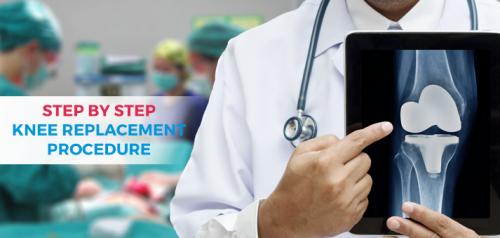Step By Step Knee Replacement Procedure

Article
Knee replacement surgeries are complex operations in which prosthesis is substituted at the place of damaged knee parts. This type of surgical intervention needs a lot of detailed planning and proper evaluation of the situation with regards to taking proper care for causing minimum risk and side effects to the health of the patient. Thereby, in any top-rated hospital, the entire procedure of knee replacement surgery is performed through strict compliance to the standard procedure where diagnostic assessment precedes the operation and post-operative care is essential as well as necessary to help the patient overcome the phase of treatment and reclaim their normal life.
1. Pre-operative procedures
Diagnostic assessment
- Opting for knee replacement surgery is not a single-headed, instant decision. Instead, proper planning goes into this surgery for obtaining the best results.
-
- The doctors want to make sure that the cause of knee pain and related problems is eliminated with the surgery which makes a diagnostic assessment necessary for knee replacement surgery.
-
- The patient's medical history and genetic background are evaluated along with a physical examination.
-
- Blood tests, laboratory tests such as MRI tests and CT scans, and X-rays of the area to be operated are usually performed.
Counselling
- Knee replacement surgery are complex in nature and the patient has to wait for few months before they are completely healed for a normal lifestyle, sessions of counselling help the patient to understand what will be the outcome after the surgery.
-
- In addition to that, the patient can clarify their doubts about knee replacement surgery directly with the doctor.
-
- The sessions of counselling are only effective when the patient conveys their problems to the doctors, that is what for which these sessions are conducted in the first place.
-
- If you have any other health problem and even if you are not sure whether it could be linked with the knee problem, it is your responsibility to tell this to your doctor. The evaluation of the entire problem is their responsibility.
-
- If you eating any regular medications or even healthy supplements, convey this to your doctor.
-
- Women who are expecting, the news of pregnancy should be made clear to the doctor.
-
- Counselling sessions are not one-way, the doctors are there to help you understand. Convey your issues and you will get your answers.
2. Surgery
- The patient is kept under the influence of anaesthesia, this helps in comforting the patient throughout the surgery.
-
- Usually, doctors shave off the hair from the area to be operated to avoid any possibility of likewise risk during the surgery.
-
- The surgery starts by making an incision in the knee. Many methodologies have been developed in this regard to make sure that the size of the incision is kept as minimal as possible for quick healing.
-
- This marked incision acts as an entry point for removing the damage knee parts. The removed portions of the knee are substituted with the prosthesis.
-
- After the substitution is complete, the incision is closed with sutures and the patient is shifted to a room from the operation theatre.
3. Post-operative care
Once the knee replacement surgery is complete, the entire does not come to an end. In fact, postoperative care can determine the success of the entire knee replacement surgery.
At the Hospital
- After the surgery, the patient is transferred to a comfortable bed.
-
- Once the effect of anaesthesia wore off, the pain from surgery can be severe. Doctors provide anti-inflammatory drugs and painkillers for relief to the patient.
-
- For some days, contingent upon the complexity of the knee replacement surgery and the rate of improvement in the patient's health, the patient can be discharged from the hospital.
-
- Before hospital discharge, the patient is made familiar with the practices of the rehabilitation programme.
At Home
- Availability of a family member or friend at home is crucial because the patient after a knee replacement surgery is not in the position to carry out the normal lifestyle until complete recovery is made. The home should be made friendly for the patient by practices such as installing handrails in the bathroom.
Physical exercise
- The routine of physical exercises is an important part of the rehabilitation programme. These activities are designed in a way to improve the movement in the operated knee. Also, they keep the pressure level at the knee to an optimal level only.
Diet
- After the knee replacement surgery, the patient should take proper care of their diet. A well-balanced diet enriched with the proper amount of nutrients and vitamins is effective in promoting quick healing. Knee-friendly elements in the diet can show considerable improvement in the working of the knee.
Conclusion
Dr. Aashish Chaudhry, a top-rated surgeon known for years of work in the field of knee replacement surgery in India, he advises on choosing the best knee replacement hospital in Delhi or in those places where strict compliance is shown to standard procedures. An esteemed knee replacement hospital in Delhi will provide you with the best orthopaedic doctor in Delhi.
Post Your Ad Here
Comments